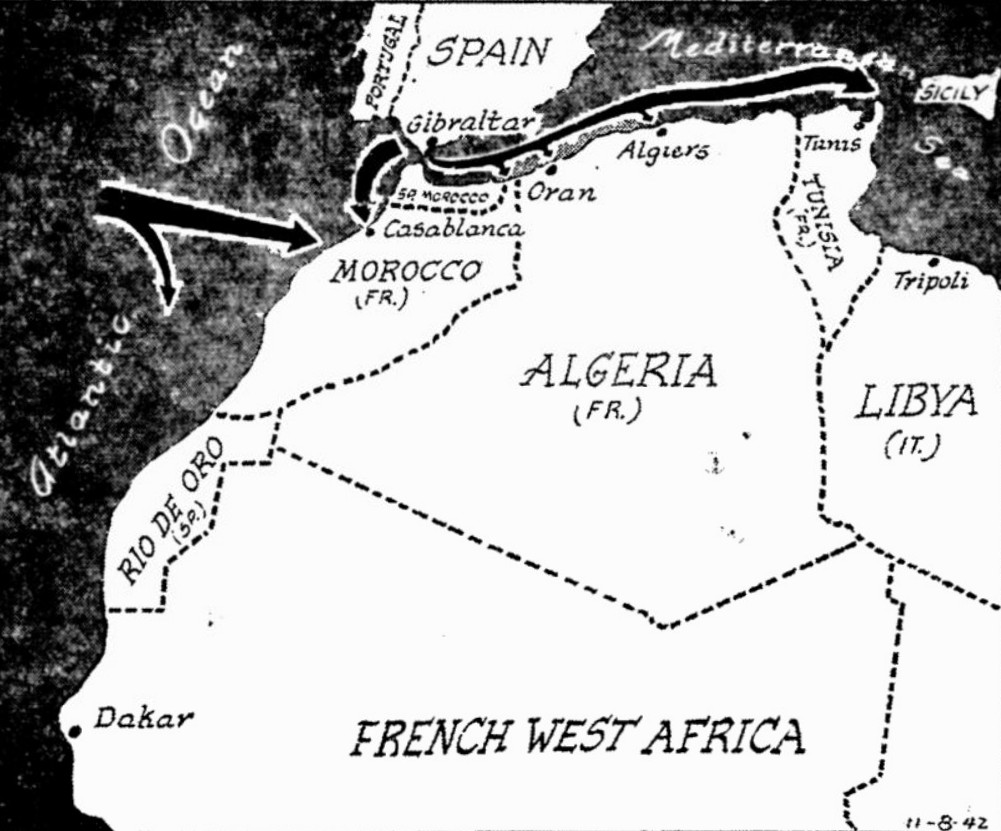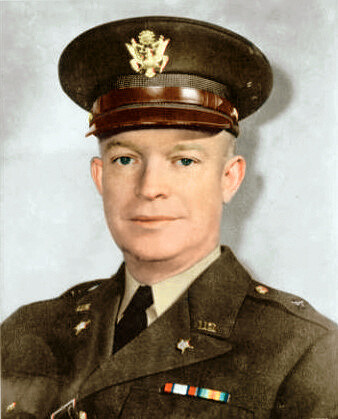The Pittsburgh Press (November 8, 1942)
U.S. INVADES FRENCH AFRICA; TROOPS LAND ON 2 COASTS
Powerful forces strike to spike threat by Axis
Land, sea and air units sent against colonies, Vichy government informed
By Lyle C. Wilson, United Press staff writer
The greatest offensive in U.S. history was taking place today on the shores of Africa. Along the Atlantic and Mediterranean coasts of French colonies, thousands of Americans were pouring ashore. The exact points of the invasion were not disclosed but it is certain that it is the general area of the arrows on this map.
Washington – (Nov. 7)
A powerful American Expeditionary Force, composed of Army, Navy and air elements, tonight began landing on the Atlantic and Mediterranean coasts of French African colonies to prevent Axis invasion and to give Russia effective second-front assistance.
The first dispatch from U.S. Headquarters in Africa said that the invasion was led by the world’s greatest naval armada and that the offensive was the greatest single military operation in American history. The dispatch said that no resistance had been encountered by the thousands of U.S. soldiers who were pouring ashore.
The White House and War Department announced the invasion in force 11 months to the day after Japan’s attack on Pearl Harbor.
U.S. Army authorities in London immediately flashed word that this is:
…the start of the real American war in the European Theater of Operations.
Lt. Gen. Dwight D. Eisenhower, for some months commander of U.S. forces in the European Theater, commands the African expeditionary force. The White House announcement explained that the blow would deny the Axis a starting place for any invasion of the Americas across the South Atlantic.
A War Department communiqué, issued simultaneously, said landing operations were started “during the hours of darkness tonight at numerous points on the shores of French North Africa.” The White House said the landings were on both the Atlantic and Mediterranean coasts of French African colonies.
The widest possible interpretation of those statements would cover a stretch of coastline from Dakar northward to the Straits of Gibraltar and thence east to a point approximately south of Italy and near German Marshal Erwin Rommel.
This first great effort of an American fighting force in the Old World theater may quickly develop into a western arm of a movement designed to pinch Rommel’s Afrika Korps in a grip of death.
Both President Roosevelt and Gen. Eisenhower broadcast reassuring messages to the French people and the Vichy government. They said we sought no spoils or territory but sought only to defeat the Axis and go home.
Gen. Eisenhower’s appeal advised French garrisons that he had:
…given orders that no offensive action be undertaken against you on condition that for your part, you take the same attitude.
Joseph Stalin told the Russian people Friday that United Nations failure to open a second front would mean catastrophe for them, but he also expresses confidence that such a front would be opened sooner or later.
A high official here has been informing other officials and the press that the Russians would not regard even a smashing United Nations victory in North Africa as adequate second-front assistance. But that was before our invasion of French African colonies became known.
The White House said the invasion was undertaken to:
- Prevent Axis military occupation of any part of North or West Africa.
- To deny the Axis any African springboard from which to launch an attack against the Americas.
- To provide second-front assistance to “our heroic allies in Russia.”
The White House announcement said:
The landing of this American Army is being assisted by the British Navy and Air Forces and it will, I the immediate future, be reinforced by a considerable number of divisions of the British Army.
This expedition will develop into a major effort by the Allied nations and there is every expectation that it will be successful in repelling the planned German and Italian invasion of Africa and prove the first historic step in the liberation and restoration of France.
The statement emphasized that the French government as well as the French people had been informed of the United Nations’ intention to move into French colonial Africa, but there was no intimation that Vichy had agreed to the high strategy.
This story of an American invasion of Africa from the Mediterranean is being pounded at a jittery Europe tonight as a foretaste of what is to come as the United Nations’ offensive gained momentum and the Axis begins to bend and break.
Europe has been nervous for days. Even from Berlin, there have been reports of the movement of tremendous convoys into the Mediterranean and this good news for the United Nations is accompanied by uninterrupted successes of the British 8th Army in Libya where Rommel seems to be on the run, and fast.
Vichy has consistently opposed the use of its territory, colonial or otherwise, as bases against the Axis. If the Vichy government has not agreed to this invasion, it would appear that the thin strand of formal relations existing between the United States and the government of unoccupied France is finally about to break.
White House Secretary Stephen T. Early refused to amplify the White House announcement reference to a second front. The White House said that the invasion:
…provides an effective second-front assistance to our heroic allies in Russia.
Mr. Roosevelt’s appeal in French to the French people was recorded and is being broadcast from British stations. He explained what the U.S. forces were undertaking and why. He said:
We come among you to repulse the cruel invaders who would remove forever your rights of self-government, your rights to religious freedom, and your rights to live your own lives in peace and security.
We come among you solely to defeat and rout your enemies. Have faith in our words. We do not want to cause you any harm.
We assure you that once the menace of Germany and Italy is removed from you, we shall quit your territory at once.
The White House announcement, which read as though it might have been dictated by Mr. Roosevelt himself, put extraordinary emphasis upon the necessity of American occupation of the French colonies to prevent an Axis invasion of those areas.
The announcement said in its opening paragraph:
In order to forestall an invasion of Africa by Germany and Italy, which, if successful, would constitute a direct threat to America across the comparatively narrow sea from Western Africa, a powerful American force equipped with adequate weapons of modern warfare and under American command is today landing on the Mediterranean and Atlantic coasts of the French colonies in Africa.
Implicit in that language is heartwarming assurance that this United Nations thrust is neither too little nor too late. It is evidently a mighty and well-armed force that Lt. Gen. “Ike” is leading tonight south and eastward into the colonies so long controlled by France.
Daylong in the capital, the word was that something big was coming – “maybe bigger than Pearl Harbor” – and certainly better. The advance notices appear to have been pretty well-founded in fact.
The White House executive offices and press room did not close as usual toward 6 p.m., and shortly after 8 p.m., newspapermen were notified that something was coming from the War Department too.
It did not take that Department many words to say what was up War Department Communiqué No. 232 said it in two tense paragraphs, describing the landing operations as being directed against “French North Africa.” That communiqué likewise emphasized the imminence of Axis movement in that region, explaining that:
The operation was made necessary by the increasing Axis menace in this territory. It said the French people were being given early advice of the landing by radio and leaflets.
There seems to have been some news leak. Press reports have indicated that Gen. Eisenhower was not in London or would soon be landing. A New York columnist this week teased his readers with a gossipy line to the effect that everybody would be surprised at the place from which the general would next appear in the news.
London reported the Axis radio sputtering with rumors of an imminent blow by the United Nations in the Mediterranean or Africa. And there have been rumors current along the Atlantic Seaboard of an enormous convoy which cleared our ports a good many days ago, a convoy so large as to be almost unbelievable.
The President’s statement followed close on reports that powerful British and American naval units had streamed through the narrow Mediterranean passage at Gibraltar en route for a destination to support the smashing drive against the German forces of Marshal Rommel, this drive spearheaded by the British 8th Army.

